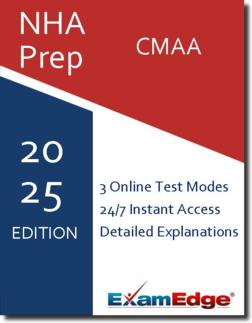NHA CMAA (CMAA) Practice Tests & Test Prep by Exam Edge - Topics
Based on 17 Reviews
- Real Exam Simulation: Timed questions and matching content build comfort for your NHA CMAA test day.
- Instant, 24/7 Access: Web-based NHA Medical Administrative Assistant Certification practice exams with no software needed.
- Clear Explanations: Step-by-step answers and explanations for your NHA exam to strengthen understanding.
- Boosted Confidence: Reduces anxiety and improves test-taking skills to ace your NHA Medical Administrative Assistant Certification (CMAA).

Understanding the exact breakdown of the NHA Medical Administrative Assistant Certification test will help you know what to expect and how to most effectively prepare. The NHA Medical Administrative Assistant Certification has multiple-choice questions The exam will be broken down into the sections below:
| NHA Medical Administrative Assistant Certification Exam Blueprint | ||
|---|---|---|
| Domain Name | % | Number of Questions |
| Office Procedures | 50% | 25 |
| Office Procedures Related to People | 10% | 5 |
| Office Procedures Related to Financial Documents, Correspondences, Files Forms, and Other Records |
26% | 13 |
| Office Procedures Related to Scheduling | 10% | 5 |
| Office Procedures Related to Healthcare Team Members and Community Resources | 2% | 1 |
| Office Procedures Related to Healthcare Information Research and Presentation | 2% | 1 |
| Financial Procedures | 30% | 15 |
| Financial Procedures Related to the Policies of the Organization | 10% | 5 |
| Financial Procedures Related to the Cash Flow of the Organization | 20% | 10 |
| Risk Management | 20% | 10 |
| Risk Management Related to People | 5% | 3 |
| Risk Management Related to Compliance | 15% | 8 |


